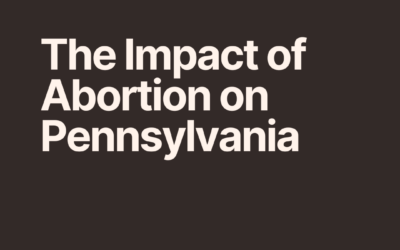Key Points
- Pennsylvania’s biology standards ought to include foundational education on early human life development.
- SB 973 and HB 606 create a healthier Pennsylvania, where those who will raise the next generation will be equipped with knowledge to make informed and healthier choices, resulting in healthier pregnancies and healthier children.
- SB 973 and HB 606 would include ultrasound videos showing vital organ development over seven specified gestational ages in the biology curriculum.
- The biology curriculum would also include high-quality, computer-generated animated renderings of an unborn baby’s development inside the mother’s womb and instruction on the effects of drugs, alcohol, and tobacco on the mother and child.
SUMMARY
As science and technology continue to advance, school curricula must keep up. Recent legislation, Senator Michele Brooks’ SB 973 and Representative Joe Hamm’s HB 606 would ensure Pennsylvania students receive early human life development education. This would empower them with foundational information about life and wellness and help them to make informed decisions to have healthy pregnancies when the time comes.
These bills would have the biology curriculum include ultrasound videos showing vital organ development over seven specified gestational ages in the biology curriculum. The biology curriculum would also include high-quality, computer-generated animated renderings [i.e., a scientifically accurate motion picture] of an unborn baby’s development inside the mother’s womb and instruction on the effects of drugs, alcohol, and tobacco on the mother and child. Students can watch an unborn baby grow from the moment he or she is conceived until the time he or she is born.
Advancements in science and technology have made it possible to view the miraculous growth of babies inside their mothers. According to the Endowment for Human Development, unborn babies have beating hearts and detectable brain waves, fingers, and toes, by nine weeks of pregnancy. At this time, a baby can also suck its thumb, open and close its jaw, stretch, and sigh. By just 10 weeks, these little lives are making breathing motions and can yawn. With this new legislation, public school students will better understand the miraculous progression of human life from conception to birth.
Knowledge about prenatal development—such as the significance of fertilization, implantation, or milestones like thumb-sucking at 10 weeks—equips high school students to make informed health choices that prepare them for healthy pregnancies after high school. For example, understanding critical periods (e.g., when organs form) can emphasize the importance of prenatal care, nutrition, and avoiding harmful substances, leading to better outcomes for future children.
Additionally, learning about early development fosters health literacy, enabling students to understand medical information related to pregnancy. This includes recognizing the importance of early prenatal visits and how environmental factors affect fetal development.
Early human development education is a natural fit with existing biology materials. Many biology curricula already include topics like cell division, genetics, and organ systems. Early human development education integrates these concepts in a real-world context, reinforcing learning outcomes. Early human development, from fertilization through embryonic and fetal stages, is a core aspect of human biology. Teaching it provides students with a comprehensive understanding of how life begins and progresses, aligning with biology’s goal of exploring life processes.
Students learning in public schools throughout the Commonwealth deserve to receive medically and scientifically accurate information about early human development of life inside the womb.
TAKE ACTION
Take Action: Ensure The Best Education for Students Through Early Human Development Education
Act Now
ADDITIONAL ARTICLES
Related Articles
Committee Hearing Highlights Heroic Work of Pregnancy Resource Centers in PA Who Help Women and Families in Local Communities
Attacks on PA’s network of pregnancy centers would impact thousands of women and families who receive a variety of life-affirming resources. (HARRISBURG, PA - June 7, 2023) Two women who lead pregnancy resource centers in Pennsylvania, along with several of the...
June marks one year since the overturn of Roe and Casey. How has it impacted Pennsylvania?
Series: The State of Abortion in PA1. Post-Roe Pennsylvania2. Taxpayer-Funded Planned Parenthood in PA3. Pregnancy Resource Centers: Essential for PA Families4. Ways to celebrate Roe's overturn Saturday, June 24th will mark the first anniversary of the Dobbs decision...
Pro-abortion Hearing Admits the Difference Between a Miscarriage and an Abortion is a Heartbeat
(HARRISBURG, PA - March 29, 2023) The Pennsylvania House Democrats today held a hearing about “expanding access to reproductive healthcare” - but in reality they proposed eliminating critical safety requirements regarding abortions, especially the requirement that...
Gosnell Trial Timeline: Highlights from Five Weeks of Testimony
Five weeks of testimony, one witness after another (54 witnesses total) telling of beheaded babies, snipped spines, and a filthy clinic. Jurors were shown color photos of aborted fetuses – some as old as seven months, others allegedly born breathing and...
Kermit Gosnell Was Convicted 10 Years Ago. Let Us Not Forget Why He’s In Jail
Four things to remember from Gosnell’s trial that (eventually) shook the world. By Dan Bartkowiak Five abortions every day for 22 years. That amounts to over 40,000 abortions. It stands as the number of abortions reported by Kermit Gosnell from his state-licensed...
Geer: My take on Gov. Shapiro’s Budget Address
By: Michael Geer On Tuesday, Pennsylvania’s new Governor, Josh Shapiro, delivered his first-ever budget address, which, here at the state level, is probably the closest thing to a “State of the Union” address. The Governor’s budget speech sets forth the...






